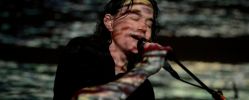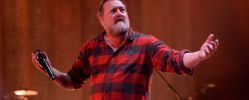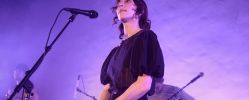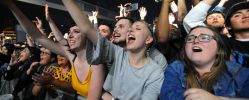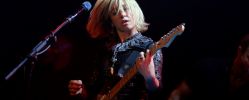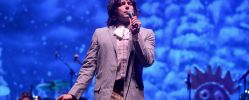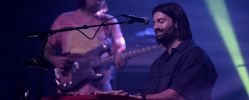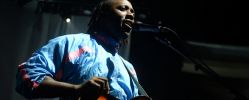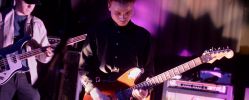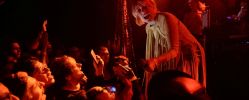
Bill Frisell: The Losanjealous Interview: Bill Frisell Trio Plays Largo April 13
Bill Frisell, legendary jazz guitarist, is debuting a new trio on the west coast, including a show at Largo on April 13th. We caught up with Bill in the Seattle airport just as he was putting his belt and shoes back on. He was delightful and excited to talk about his new band.
BF: Hello?
Q: Hi Bill – this is Dave from losanjealous.com – is now still a good time to talk?
BF: Sure – I am just here at the airport.
Q: Nowhere better than SeaTac for a nice conversation about music, huh?
BF: (laughs) Right. Are you calling from England?
Q: Yeah – I live in London but Seattle is home – that’s the connection. I’ve seen you a zillion times around there, so I jumped at the chance to do the interview.

BF: Oh cool. Glad it worked out.
Q: I actually saw you recently here in London – a show at the Barbican…
BF: Remind me which gig that was? Oh wait…you saw the show with the [BBC Symphony] Orchestra and Mike Gibbs?
Q: That’s the one.
BF: Oh that show was just an amazing thing for me. Mike is just a such a special guy; a real teacher and a friend. It was a dream come true to do that gig.
Q: How did that come about – putting your music together with an orchestra?
BF: I didn’t know if it was going to work, with the big orchestra and everything…
Q: It was a great show. You’ve played with Joey Baron for over 20 years. But it was great hearing that conversation you do so easily with Joey, this time done with a full orchestra.
BF – Thanks. I hope that’s what happened. I would love to do it again…it was the first time I tried that. Next time I would do it even looser, try to break it apart even more.
Q: I went with some friends; they had not seen you live before. Several folks remarked that the obvious chemistry between you and Joey – you know, actually seeing you guys communicate onstage – added a lot to the appreciation of how you guys improvise. Are you aware of that when you are onstage?
BF: Well…no, not at all. I’m really focused on whoever I’m playing with. I mean, I get a lot of the energy from the audience – I can feel that. But when I am playing – for it to be good – I am really focused on listening and responding to the other musician. That doesn’t mean I want to exclude the audience from what I’m doing on stage. But I really need to focus on Joey or whoever I’m playing with at the time. And when it’s going really good, well…I don’t know where I am.
Q: Cool. Well, let’s do some interview questions (laughs). How about this new band? You’ve been playing with Kenny Wollesen for years but this is the first time with Jason Moran in a band, right?
BF: To tell you the truth, I don’t know if this is even a band yet (laughs). We’ve got a chance to do four nights at Yoshi’s, the LA gig, and San Diego. We’ll probably play a different mix of things each night.
Q: How did this come about – playing with Jason?

BF: Wow…hmmm…I just need to think about how to tell this story in less than 1 hour (laughs). OK… there’s this community in Alabama – deeply rural, isolated on a river’s peninsula. It was a slave community and then, after the civil war, it became mostly share croppers. It was and still is one of the poorest parts of the United States. It’s all – or almost all – African American. And the women there have been making quilts for years. They’ve been making them out of necessity, really. And they make these quilts out of the things they have. These are poor people, so they don’t have lots and lots of materials. So a woman, after her husband dies, might take the single pair of pants her husband had and make a quilt. And these quilts are just beautiful. So the whole story – the community, the fact that these quilts were functional, but there was also so much beauty in them – is just really interesting. They are known as Gee’s Bend Quilts. You should take a look online if you have time – really amazing. And they are still doing it today. Somewhere, someone recognized these quilts as really, really beautiful pieces of art. The SFMOMA did a show on them, some other museums have done shows.
Q: Wow – I haven’t heard about that before. After all that’s been written about that area – the books, the Lomax field recordings — it’s surprising that we keep hearing about this kind of thing. I guess that just shows how rich the culture is in that part of the world.
BF: Right – I hadn’t heard of it before, either. But recently, the Philadelphia Museum of Art commissioned Jason to create some music about this community, so he called me to play on some songs. And I actually got to go down there and meet several of the women in the community – as you can imagine, it was very moving. I had known about Jason as a musician for a while, but hadn’t played with him very much. I had played with him one other time on Jenny Scheinman’s album, but not anything else.
Q: I saw him play with his trio in the Knitting Factory’s old basement [in Tribeca] several years ago; he was really swinging in that show. Then I saw him again last year at the Triple Door [in Seattle] with Charles Lloyd – totally different but also great.
BF: Oh yeah! I saw that band in Europe – really great. When I heard him play, I heard an emotional heart — kind of a center — in what he was playing. It just sounded like he was playing in a way that I thought might have been lost. Anyway, now we’ve got a chance to play together in these gigs – who knows? Maybe it will be a band. It’s fun to just get the opportunity to play with these guys.
Q: There’s no bass in this band. What’s that like? Do you play differently or do you expect your keyboard player to play differently?
BF: I don’t know – we haven’t played together yet so I’m not sure (laughs)! I don’t worry so much about having or not having a bass. That’s not that big a deal. In general, it’s actually a little harder to play with a piano player. But on that Jenny Scheinman album, playing with Jason, I didn’t feel that at all. I didn’t have to be careful about getting in his way or vice versa. It just felt really natural. I’ve done several bass-less bands, too, and it’s fine. I play in Paul Motian’s band with Joe Lovano – there’s no bass. We’ve been doing that for years. I’ve been trying to do something like that with some of my own bands – I play with Brain Blade [on drums] and Sam Yahel on organ. There’s also a band with Eyvind Kang and Rudy Royston – drums and a viola. I think sometimes we’re conditioned to think we need a separate bass on everything but it’s not really true. There’s so much sound down there in the guitar and the drums. The White Stripes are another example – just guitar and drums.

Q: I saw you play a gig where your band covered a Lucinda Williams song – Ventura. Then, a few months later, you show up on her album. Then, a few months after that, I saw a Lucinda Williams show and you sat in with the band. For those of us not in the music businesses, we wonder how these different musicians get together. Do you guys have a secret clubhouse where you meet up?
BF: I wish (laughs)! Before I met Lucinda, I had been a fan of hers for a long time. I was once playing a gig in Nashville and she might have known someone in the band or something. I can’t remember the whole thing, but she came in really late and introduced herself. That was a while ago….one thing leads to another. I guess I was putting some energy out there in the universe that I would love to do something with her. I don’t know exactly how it actually happened – I know Hal Willner was producing some of her music.
Q: And another mutual friend, Greg Leisz, has played with her in the past.
BF: Right – Greg had worked with her. So we had a few mutual friends. Anyway, it was fun doing the record and then, when we were both in town, she asked if I wanted to come to the gig. I said, “sure” and expected to play one or two songs. I expected to play the ones I played on the album. I knew a few other songs, but not all of them. But then she said, “no way, you’re playing the whole show!” (laughs). It was a great, great show – I had a lot of fun. She and her band were just so nice and welcoming. It was very loose, too – she didn’t even come to the soundcheck but then put on a fantastic show. When you play with her, it’s not like you’re her backup band. It’s more than that. The whole band — her, Doug Pettibone, all of them—they really let you in and makes you part of it.
Q: That sounds like it was as much fun to play as it was to watch. You end up playing with all kinds of folks. You seem to turn up as a guest on so many different records – Paul Simon, whoever. The Zorn/Downtown scene is totally different than those Gabriela albums you played on, but they all seem to work. Who would you love to play with that you haven’t yet?
BF: Oh, I don’t know…probably someone I haven’t met yet. There are lots, I’m sure. Of course I would love to play with Bob Dylan, Neil Young, Wayne Shorter, Sonny Rollins. Not just because those guys are famous or part of a checklist. But I would just like to be there and really experience playing with someone like Sonny Rollins…such a powerful musician.
Q: Do you ever end up loving someone’s music, maybe even really enjoying them personally, but it just doesn’t work with your music?
BF: Not really. It more often works than doesn’t work. The difference really is, “are they open?”. If the other musician is open and willing to make it work, it almost always works.
Q: For a while there, every show seemed to have a very political song – Masters of War, A Change Is Gonna Come. Something you were thinking about?
BF: Songs just come in naturally. I might be thinking about a particular song more, like Masters of War. I love Dylan and that song was on my mind during that time. Occasionally someone introduces me to a song because it’s on their mind, too, and it just kind of comes into the mix. A few years ago, my wife told me, “You should really listen to that Sam Cooke song.” I wasn’t all that familiar with it but really liked it after I heard it again, so I started playing it. It seemed to fit. But I’m not a political activist and sometimes a song is just really good, so I play it. Songs don’t have to be too literal in a political sense to be fun to play.
Q: I saw a Swedish band recently and they were great – very much improvisational. They played electric and some similar instrumentation as your bands. They had some gypsy jazz influences, maybe some cinematic nods. But I was struck that, even if they played your songs, the songs wouldn’t have an “American” sound. Do you feel like you bring something distinctly “American” to your music, even if you aren’t playing from the traditional American songbook?
BF: No – it’s nothing I try to bring. I mean, maybe I do sound “American”, but I can’t control it. I grew up in Denver, Colorado in the 1950’s….I played with dinosaur toys, hot rods, transistor radios. Rock and roll was just getting big. Whatever the “American” sound is or was, it was all around me growing up. I guess I don’t know exactly what “American” sounds like, but I can’t not do it. It’s all I know.
Q: You’re a musician in 2010, which means you’re forced to have an opinion on digital music. You’ve actually released several live shows via your website for download only; you’ve done digital companions for some of the music you’ve released via CD. What’s your take on it?
BF: Well, I don’t know exactly. It’s confusing – there’s just so much out there and I certainly haven’t figured it out yet. I was watching a movie recently and the character in the movie walks into a record store. I miss that – going into the old record stores, being able to hold something, interact with something solid. But I’ll admit I’m pretty confused with what’s going on out there — I just don’t know exactly how it will work out. But putting things out on the internet is great – it’s like an “escape valve” for all the stuff I haven’t documented on an album. And I just went into the studio with Eyvind [Kang] and Rudy [Royston] – I recorded it all at my expense – because I don’t yet know how we’re going to use it or release it. But I hope we don’t stop making albums. I love actually getting it right, from start to finish, and putting it together as a whole. I also love the ability to release a bunch of live shows on the internet. There is a feeling or energy you just can’t capture in the studio – you need an audience — and being able to hear that, hear that one moment in time, is important too. But with digital music – who knows? I really just don’t know where it will all go.
 Q: As is customary here at Losanjealous, I have a facial hair question for you. Those photos with the moustache from the late 1970’s/early 80’s are fantastic – are we going to see that look again?
Q: As is customary here at Losanjealous, I have a facial hair question for you. Those photos with the moustache from the late 1970’s/early 80’s are fantastic – are we going to see that look again?
BF: Oh my god (laughs). I have thought about doing porn – I think the moustache might work. (laughs). No, I can tell you the moustache won’t be coming back.
Q: (laughs) Nice. OK – I know you have to catch your plane. And I would love to keep chatting, but just one more question. In the 1980’s, Miles Davis got a lot of criticism for covering songs considered “too pop” – songs like Time After Time, Human Nature. Do you ever feel like there are songs you simply won’t do? Or genres you simply won’t touch?
BF: No. I really just ask myself, “do I like that song?”. Good music can come from anywhere. Notions of “higher” or “lower” levels of music or art – I hate that. When we put music in a hierarchy – “jazz” vs. “classical”, whatever – that really bothers me. Robert Johnson can be every bit as good as Segovia.
Q: Does that mean you will be covering Miley Cyrus in your LA gig?
BF: (laughs) You never know!
There you have it. Bill Frisell – visionary guitarist, yearning porn star, incredibly nice guy. See you at Largo on the 13th.
» Bill Frisell (official site)
Photo Credits:
(1) Jimmy Katz
(2) Michael Wilson
(3) Jimmy Katz
